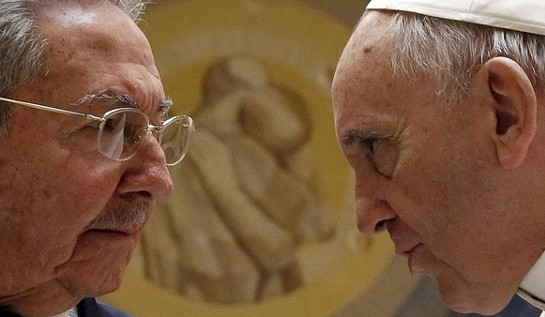Hare in the Media: Pope’s Cuba Visit
Paul Webster Hare, Senior Lecturer at the Frederick S. Pardee School of Global Studies at Boston University, said that the Castro regime faces a number of challenges as its relationships with both the U. S. and Catholic Church evolve.
Hare made these arguments in the wake of the visit of Pope Francis to the island nation – one of the few in the Latin American region without a close relationship with the Catholic Church.
On Sept. 18, Hare was quoted in an article in the Financial Times on the subject, entitled “Pope Francis Faces Diplomatic Test on Cuba Trip:”
The visit will also test the pope’s diplomatic skills: he will seek to proselytise a universal message of helping the poor, while pushing the socialist government of president Castro to increase its reforms and give a greater role to the Church.
“In the fast-approaching era of no US embargo, Castro can no longer argue that the revolution needs its restrictive laws,” said Paul Hare, former UK ambassador to Havana, now professor of government at Boston University. “Pope Francis helped to usher in this new era and it is one where the Church will ask increasingly probing questions . . . He wants to launch a new battle of ideas.”
You can read the entire article here.
On Sept. 19, Hare’s insight was quoted in the New York Times in an article entitled “Pope Francis, Arriving in Cuba, Seeks to Revive Church:”
There have certainly been times when the church has challenged the government. In the early 1990s, after the fall of the Soviet Union, Fidel Castro, knowing that he needed new allies and new sources of money, began to soften his stance on the church.
The move seemed to energize the church, which issued a statement in 1993 that sent waves through the Catholic community — and the government — in its calls for more openness to ideas outside of the state.
Ultimately, the door slammed on the church once more as Fidel Castro grew increasingly worried about its public activities and those of other Christian activists seeking to reform one-party rule.
“He felt a red line needed to be drawn against church political involvement,” said Paul Hare, a former British ambassador to Cuba and a professor at Boston University, describing the late 1990s. “So Cardinal Ortega distanced himself from these activities and we see the rifts still visible today.”
You can read the entire article here.
Hare was the British ambassador to Cuba from 2001-04. He worked for 5 years in the private sector, in law and investment banking, before serving for 30 years in the British Diplomatic Service. Hare served overseas in Portugal, New York, at the UK Representation at the EU in Brussels, and in Venezuela as Deputy Head of Mission. He has written two policy briefs for Brookings: “The Odd Couple; The EU and Cuba 1996-2008,” and “US Public Diplomacy for Cuba: Why It’s Needed and How to Do It.” Learn more about him here.
